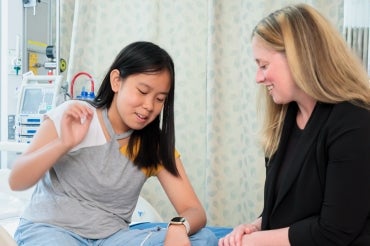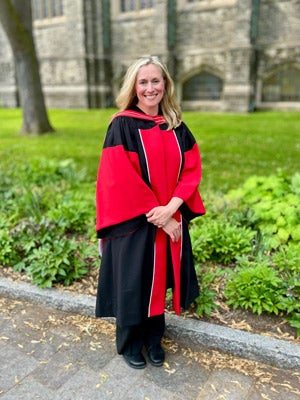U of T Nursing grad explores sleep challenges in kids with cystic fibrosis

Jordana McMurray, right, examines an actigraph worn by Camille Goncalves (photo by Horst Herget)
Published: June 16, 2025
When Jordana McMurray was working night shifts as a pediatric respiratory nurse at the Hospital for Sick Children (SickKids) she noticed something unusual: her patients with cystic fibrosis (CF) struggled with sleep.
That stood out, she says, because most hospitalized children tend to sleep more than usual.
“It was a nagging question for me,” says McMurray, who graduated earlier this month with a PhD from the University of Toronto’s Lawrence Bloomberg Faculty of Nursing. “Why do kids with CF not sleep well?”

With no established guidelines for assessing sleep in CF patients, McMurray’s research focused on understanding the relationships between sleep and symptoms of anxiety and depression in adolescents and young adults with CF, compared to their peers without chronic illness.
However, her research faced an early hurdle. At the height of the COVID-19 pandemic, McMurray found herself stuck as the research approval process slowed down. So, she volunteered with Cystic Fibrosis Canada, a national charity dedicated to improving the health of Canadians living with CF, and took virtual courses in sleep physiology and wearable technologies – skills that would ultimately play an important role in her research.
Using technology to measure sleep
In her study, participants wore an actigraph – a watch-like device with an accelerometer – to track their sleep over seven days and nights. They also completed questionnaires to assess sleep quality and symptoms of anxiety and depression, and kept a sleep diary for the duration of the study. Some participants with CF also took part in virtual interviews to share their sleep experiences.
While McMurray found that adolescents and young adults had sleep, anxiety, and depression outcomes comparable to their healthy peers – a finding that contrasts with earlier research – she noted that 82 per cent of the CF participants in her study had recently started a new modulator therapy approved for individuals with CF with eligible mutations. This new treatment may explain her study’s unexpected findings.
Still, qualitative data collected from the interviews suggest young people with CF continue to face unique sleep challenges.
Participants reported that CF symptoms such as coughing and abdominal pain disrupted their sleep. Additionally, many CF treatments – including physical therapy to drain thick mucus from airways – required them to go to bed later and wake up earlier. While some treatments improved respiratory symptoms, others had a stimulating effect that made it harder to fall asleep. Participants also described how CF-related anxieties and unrelated anxieties, as well as changes in their health status, interfered with their ability to get a good night’s rest.
Balancing research and parenthood
McMurray says the challenges of completing her PhD were compounded by the pandemic and being a mother to young children.
“I have had a lot of people ask me what it is like to be a mom and a student. I am honest when I say it was a big challenge, especially during COVID,” she says.
“I had to recognize that my path was not going to look the same as other students’.”
Now, as a postdoctoral researcher, McMurray is working on a randomized controlled trial to test whether a sleep-promoting mobile phone app can help adolescents get more sleep and improve their mental health and well-being. Developed by Professor Robyn Stremler, dean of the Lawrence Bloomberg Faculty of Nursing, the app uses a wearable sleep tracker and theory-based behavioural strategies. It also incorporates real and virtual rewards to encourage earlier bedtimes.
“It’s an exciting time to be studying sleep and mental health in young people,” McMurray says. “As research advances, we continue to better understand how these two vital aspects of well-being are deeply connected, which opens the door for early interventions.”



